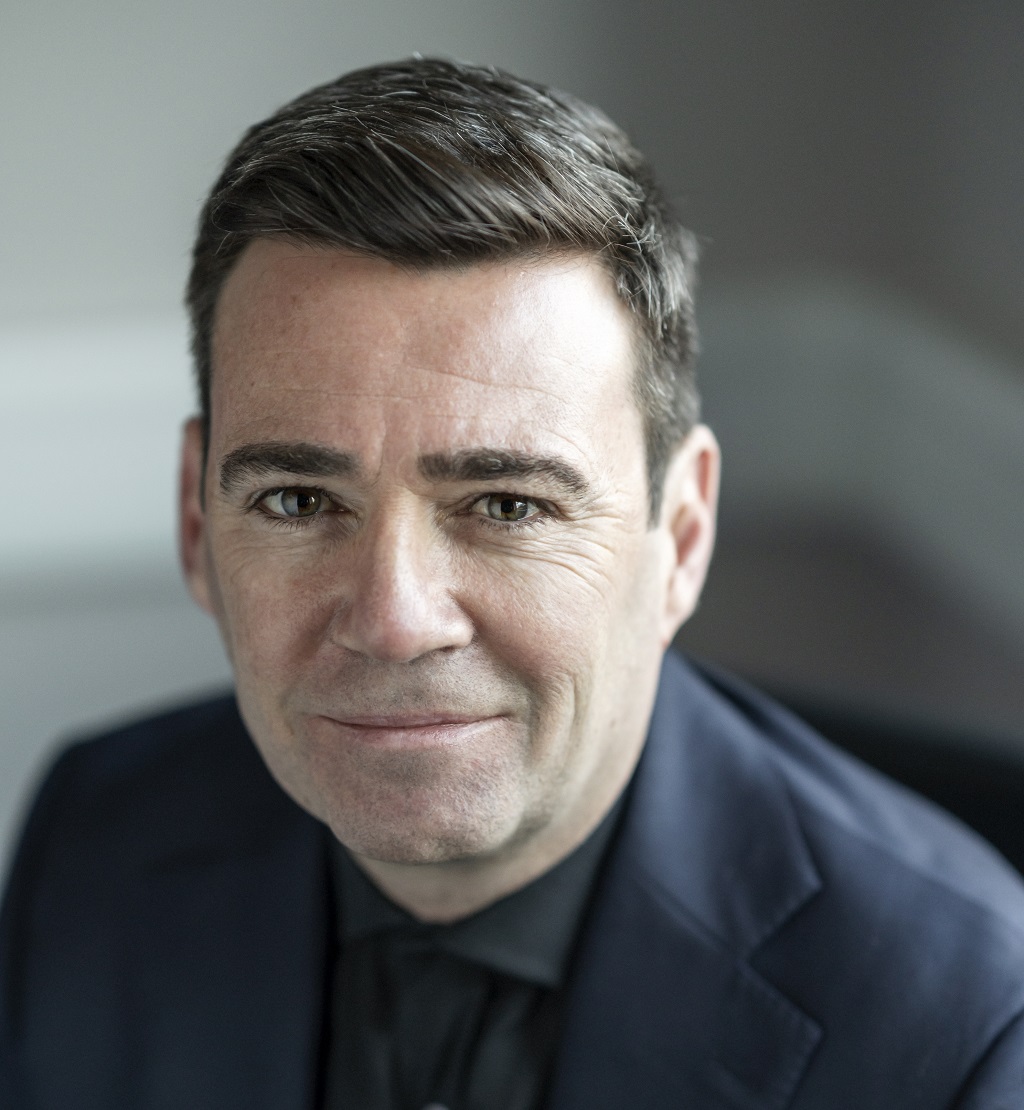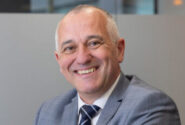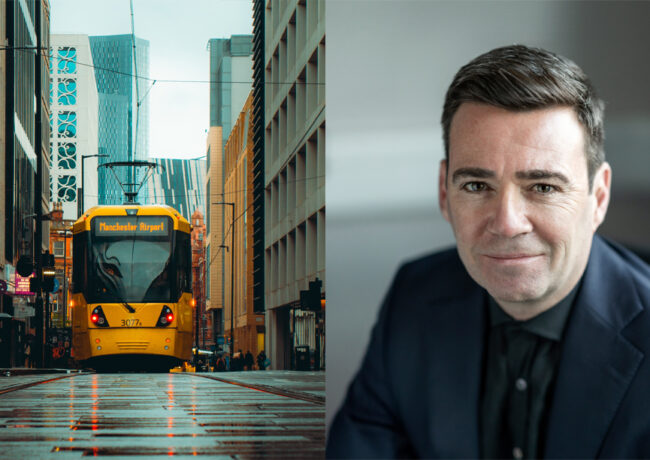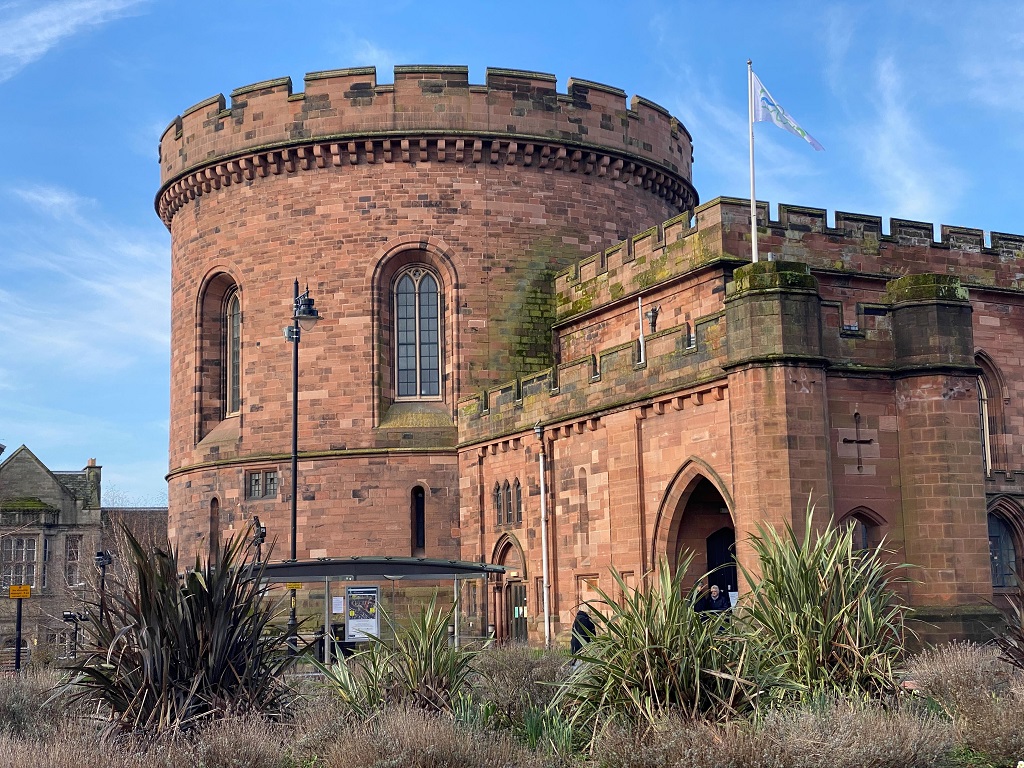Andy Burnham to speak at Place’s Transport + Infrastructure event
An ‘In Conversation With the Mayor of Greater Manchester’ will kick off Place North West’s crucial update on transport and development in the region. Mayor Andy Burnham joins a robust speaker line-up, which also features Transport for the North, Avanti West Coast, Muse, and more. Book your ticket to the 25 January conference now.
Transport is a major economic driver and at the core of any community’s plans for growth. Getting it right is crucial.
But the old playbook for how to approach these projects – and how to make the most out of the opportunities they create – is changing, with renewed focuses on active travel and public transport, changing government policies, and technological advances.
So what does all this mean for the developers, planners, engineers, policymakers, and everyday citizens of today?
At Transport + Infrastructure, we’ll be digging into the current transport situation, strategic visions for the future, and the real-world obstacles and opportunities when it comes to delivering these schemes.
Transport + Infrastructure will be held on 25 January at Manchester Hall (36 Bridge Street). This half-day conference begins at 8am and is sponsored by Waterman and Mills & Reeve.
Expect a series of dynamic panel discussions as well as the networking opportunities we know are important for your business. In addition to the pre-panel breakfast, you can also expect breaks in between sessions and a post-panel lunch.
What you’ll take away from the conference
- Insight into how infrastructure is changing to adapt to future needs and priorities
- Knowledge regarding how development is responding to transport policy, and vice versa
- An understanding of what changes to transport infrastructure are coming down the pipeline
- New contacts for your business
Confirmed speakers
 Andy Burnham is the Mayor of Greater Manchester. Under his leadership, Greater Manchester took back control of its buses and introduced the Bee Network, a public transport network that controls the trams, buses, and bikes and seeks to improve the walking and cycling infrastructure in the region.
Andy Burnham is the Mayor of Greater Manchester. Under his leadership, Greater Manchester took back control of its buses and introduced the Bee Network, a public transport network that controls the trams, buses, and bikes and seeks to improve the walking and cycling infrastructure in the region.
 Mark Osborne is the regional growth manager at Avanti West Coast. More than 26m passenger journeys took place using Avanti West Coast trains last year. The train operator connects travellers between the North West and London, and stops in Liverpool, Manchester, Birmingham, Edinburgh, and Glasgow, as well as the capital city. Osborne’s background is in transport planning and local authorities, with a resume including roles at St Helens Council, Mott MacDonald, and Wirral Council. He will bring his insight as a planner working for one of the largest rail operators in the country to discuss the current state of transport infrastructure and what’s next.
Mark Osborne is the regional growth manager at Avanti West Coast. More than 26m passenger journeys took place using Avanti West Coast trains last year. The train operator connects travellers between the North West and London, and stops in Liverpool, Manchester, Birmingham, Edinburgh, and Glasgow, as well as the capital city. Osborne’s background is in transport planning and local authorities, with a resume including roles at St Helens Council, Mott MacDonald, and Wirral Council. He will bring his insight as a planner working for one of the largest rail operators in the country to discuss the current state of transport infrastructure and what’s next.
 Darren Oldham is the rail and road director and deputy chief executive of Transport for the North. Transport for the North brings together local authorities, Network Rail, National Highways, and other business leaders to both provide a strategic vision and advocate for transport infrastructure investment in the North. Oldham has more than 30 years of experience in planning and regeneration and will be using this experience to weigh in on what the future holds for the North and what this will mean for the development sector.
Darren Oldham is the rail and road director and deputy chief executive of Transport for the North. Transport for the North brings together local authorities, Network Rail, National Highways, and other business leaders to both provide a strategic vision and advocate for transport infrastructure investment in the North. Oldham has more than 30 years of experience in planning and regeneration and will be using this experience to weigh in on what the future holds for the North and what this will mean for the development sector.
 James Lancaster is the head of EU mobility innovation, policy and partnerships at Enterprise Mobility and the chairman of the Urban Mobility Partnership. Lancaster works alongside local governments, transport authorities, and the private sector to develop new strategies and services to transform the way we get from point A to point B. As head of European mobility innovation at one of the world’s largest mobility services companies, he has his finger on the pulse of the changes coming to the sector. In his role at Urban Mobility Partnership, Lancaster leans into the policy side of things and has explored ways to change the commuting experience as well as clean air zones.
James Lancaster is the head of EU mobility innovation, policy and partnerships at Enterprise Mobility and the chairman of the Urban Mobility Partnership. Lancaster works alongside local governments, transport authorities, and the private sector to develop new strategies and services to transform the way we get from point A to point B. As head of European mobility innovation at one of the world’s largest mobility services companies, he has his finger on the pulse of the changes coming to the sector. In his role at Urban Mobility Partnership, Lancaster leans into the policy side of things and has explored ways to change the commuting experience as well as clean air zones.
Mel Wilson is a director of regional development advisory at Deloitte. Wilson will bring her 15+ years of regeneration project delivery experience to our conference to debate what developing in a post-HS2 world looks like, what opportunities remain, and what needs to be done to encourage growth in the North.
Richard White is an associate director at Waterman. Waterman provides multidisciplinary advice on a variety of infrastructure projects, including highways, rail, aviation, and commercial development. Waterman approaches projects with a sustainability lens, focused on helping communities reach net zero and be climate resilient.
Julian Stott is a development director at Muse. Placemaker Muse is active throughout the North West, helping regenerate communities in Lancashire, Cheshire, and Greater Manchester. Stott has been leading the team’s Basford East logistics scheme in Crewe and will weigh in on the impacts of transport on development – and what the loss of HS2 has meant for the area.
Nicola Kane is a director at Steer. Kane is one of the leading transport strategists in the North West, having previously been head of strategic planning, insight, and innovation at Transport for Greater Manchester. While at TfGM she developed Greater Manchester’s transport strategy for 2040. Steer is an award-winning global consultancy known for its technical and planning expertise in transport and infrastructure.
Emma Antrobus is the North West director for the Institution of Civil Engineers. ICE boasts a membership of 95,000 engineers from across the globe and regularly provides advice to policymakers on how best to build, maintain, and adapt infrastructure. As ICE’s North West director, Antrobus will discuss the current situation facing today’s infrastructure and what needs to be done to help the UK scale up its ability to deliver major schemes.
Nick Helm is a partner at Mills & Reeve. Helm has more than 20 years of experience in providing legal advice for infrastructure and energy projects, especially when it comes to how to procure, deliver, and manage major schemes.
Mark Robinson is the director of economy and place at Rochdale Council. Regeneration, housing, transport, and placemaking all fall under his remit. He is currently working alongside public and private sector partners to deliver the council’s ambitious transit-oriented development projects, including the Rochdale Rail Corridor and Atom Valley Mayoral Development Zone.
Book your ticket today by using the form below.
If you cannot see the form, please contact events@placenorthwest.co.uk.













I was recently in Prague. They have an efficient tram system, a three line Underground service which has stops near to all the trams, buses and trains. A day ticket for 24hrs was less than £5.00. The trams had ticket machines on the vehicles, so you weren’t missing the tram, trying to get a ticket. Why are we so incapable in this country of providing similar? This system woukd be spot on for Manchester, as the city centre of Prague is a similar size.
By Elephant
@ Elephant Because of money
By Anonymous
@Elephant: Good points and I agree we could do a lot better. There are a couple of differences between Prague & MCR. Prague is a capital city and like us in the UK, we all know how much more infrastructure a city can get when the politicians live in said city. The Czech Republic also pay more tax, which helps to fund & subsidise infrastructure. Their tram system is also a tram system, whereas Metrolink is more like a stadtbahn that people call a tram (e.g. an inverted version of Frankfurt’s U-bahn which isn’t actually an u-bahn like Metrolink isn’t a metro). We don’t have a Metro nor a tram but something sort of inbetween. You know the saying “jack of all trades master of none”.
We get very little funding and what we get we generally use to expand the network’s route, which is important, but we neglect expanding the existing network.
In reality, we should also upgrade our existing network, expanding to 3 car trains on all lines, with all central city traffic going underground to remain full segregated from traffic and pedestrians. This would turn it into a proper stadbahn or “pre-metro”.
That said, all of this requires funding, which requires paying more tax, something the British people almost unanimously don’t want.
So in order to have the cake and eat it, we need to be willing to pay for said cake via higher tax. At this point a significant number of people would be saying “we pay enough tax” and some even believing we pay the most in Europe, but search Wikipedia European tax and you’re see we are at the low end… the very fact so many people will disagree with this shows where the problem really lies.
Andy Burnham has been doing a good job with the limited funds available and all the restrictions from central government. But there is one other area where we could improve – our suburban rail network. If we widen all express routes into MCR to 4 tracks (or build new underground express routes that HS2 and NPR would have provided) we could then turn the vast suburban rail network we already have into a high frequency S-bahn or RER type service… That would make a huge difference
By EOD
@January 17, 2024 at 9:47 am
By Elephant
Blackpool also has clean efficient trams where you buy your ticket on the tram.
By Rye&Eggs
Who said there is no money to invest in infrastructure? I have an idea. Borrow money (private credit or public debt?) to invest and for years reap economic benefits. It is called capitalism. But that silly idea will never catch on. Those canals, works, railways and that ship canal will never be built.
By Anonymous
EOD. Thank you for your concise, informative response. Prague is indeed a capital city,however it’s economy is almost identical in size to Greater Manchester’s, in fact our’s is slightly bigger. They get more visitors than us too, which will help subsidise it.
By Elephant
Blackpool has trams but they serve has a tourist draw. Blackpool is not the centre of the North’s economy, Greater Manchester is.
By Elephant
@January 18, 2024 at 10:16 am
By Elephant
The Blackpool Tram also serves Fleetwood, Cleveleys and many other stops. It should ideally be extended into Lytham. The Fylde Coast has almost as many people as Iceland – over a third of a million.
Yes we know that GM is the centre of the NW economy. It’s, of course, good that it has become a major regional player. But there’s also Lancashire’s leading aerospace and advanced manufacturing industries, not to mention Liverpool’s economy.
By Rye&Eggs
I don’t think funding public transport is a priority for the public. I bet if you asked most people in Greater Manchester if money should be spent on the tram or something else the vast majority would something else.
By Gilly